#trustbusting
Text
Antitrust is a labor issue

I'm touring my new, nationally bestselling novel The Bezzle! Catch me SATURDAY (Apr 27) in MARIN COUNTY, then Winnipeg (May 2), Calgary (May 3), Vancouver (May 4), and beyond!

This is huge: yesterday, the FTC finalized a rule banning noncompete agreements for every American worker. That means that the person working the register at a Wendy's can switch to the fry-trap at McD's for an extra $0.25/hour, without their boss suing them:
https://www.ftc.gov/news-events/news/press-releases/2024/04/ftc-announces-rule-banning-noncompetes
The median worker laboring under a noncompete is a fast-food worker making close to minimum wage. You know who doesn't have to worry about noncompetes? High tech workers in Silicon Valley, because California already banned noncompetes, as did Colorado, Illinois, Maine, Maryland, New Hampshire, North Dakota, Oklahoma, Oregon, Rhode Island, Virginia and Washington.
The fact that the country's largest economies, encompassing the most "knowledge-intensive" industries, could operate without shitty bosses being able to shackle their best workers to their stupid workplaces for years after those workers told them to shove it shows you what a goddamned lie noncompetes are based on. The idea that companies can't raise capital or thrive if their know-how can walk out the door, secreted away in the skulls of their ungrateful workers, is bullshit:
https://pluralistic.net/2022/02/02/its-the-economy-stupid/#neofeudal
Remember when OpenAI's board briefly fired founder Sam Altman and Microsoft offered to hire him and 700 of his techies? If "noncompetes block investments" was true, you'd think they'd have a hard time raising money, but no, they're still pulling in billions in investor capital (primarily from Microsoft itself!). This is likewise true of Anthropic, the company's major rival, which was founded by (wait for it), two former OpenAI employees.
Indeed, Silicon Valley couldn't have come into existence without California's ban on noncompetes – the first silicon company, Shockley Semiconductors, was founded by a malignant, delusional eugenicist who also couldn't manage a lemonade stand. His eight most senior employees (the "Traitorous Eight") quit his shitty company to found Fairchild Semiconductor, a rather successful chip shop – but not nearly so successful as the company that two of Fairchild's top employees founded after they quit: Intel:
https://pluralistic.net/2021/10/24/the-traitorous-eight-and-the-battle-of-germanium-valley/
Likewise a lie: the tale that noncompetes raise wages. This theory – beloved of people whose skulls are so filled with Efficient Market Hypothesis Brain-Worms that they've got worms dangling out of their nostrils and eye-sockets – holds that the right to sign a noncompete is an asset that workers can trade to their employers in exchange for better pay. This is absolutely true, provided you ignore reality.
Remember: the median noncompete-bound worker is a fast food employee making near minimum wage. The major application of noncompetes is preventing that worker from getting a raise from a rival fast-food franchisee. Those workers are losing wages due to noncompetes. Meanwhile, the highest paid workers in the country are all clustered in a a couple of cities in northern California, pulling down sky-high salaries in a state where noncompetes have been illegal since the gold rush.
If a capitalist wants to retain their workers, they can compete. Offer your workers get better treatment and better wages. That's how capitalism's alchemy is supposed to work: competition transmogrifies the base metal of a capitalist's greed into the noble gold of public benefit by making success contingent on offering better products to your customers than your rivals – and better jobs to your workers than those rivals are willing to pay. However, capitalists hate capitalism:
https://pluralistic.net/2024/04/18/in-extremis-veritas/#the-winnah
Capitalists hate capitalism so much that they're suing the FTC, in MAGA's beloved Fifth Circuit, before a Trump-appointed judge. The case was brought by Trump's financial advisors, Ryan LLC, who are using it to drum up business from corporations that hate Biden's new taxes on the wealthy and stepped up IRS enforcement on rich tax-cheats.
Will they win? It's hard to say. Despite what you may have heard, the case against the FTC order is very weak, as Matt Stoller explains here:
https://www.thebignewsletter.com/p/ftc-enrages-corporate-america-by
The FTC's statutory authority to block noncompetes comes from Section 5 of the FTC Act, which bans "unfair methods of competition" (hard to imagine a less fair method than indenturing your workers). Section 6(g) of the Act lets the FTC make rules to enforce Section 5's ban on unfairness. Both are good law – 6(g) has been used many times (26 times in the five years from 1968-73 alone!).
The DC Circuit court upheld the FTC's right to "promulgate rules defining the meaning of the statutory standards of the illegality the Commission is empowered to prevent" in 1973, and in 1974, Congress changed the FTC Act, but left this rulemaking power intact.
The lawyer suing the FTC – Anton Scalia's larvum, a pismire named Eugene Scalia – has some wild theories as to why none of this matters. He says that because the law hasn't been enforced since the ancient days of the (checks notes) 1970s, it no longer applies. He says that the mountain of precedent supporting the FTC's authority "hasn't aged well." He says that other antitrust statutes don't work the same as the FTC Act. Finally, he says that this rule is a big economic move and that it should be up to Congress to make it.
Stoller makes short work of these arguments. The thing that tells you whether a law is good is its text and precedent, "not whether a lawyer thinks a precedent is old and bad." Likewise, the fact that other antitrust laws is irrelevant "because, well, they are other antitrust laws, not this antitrust law." And as to whether this is Congress's job because it's economically significant, "so what?" Congress gave the FTC this power.
Now, none of this matters if the Supreme Court strikes down the rule, and what's more, if they do, they might also neuter the FTC's rulemaking power in the bargain. But again: so what? How is it better for the FTC to do nothing, and preserve a power that it never uses, than it is for the Commission to free the 35-40 million American workers whose bosses get to use the US court system to force them to do a job they hate?
The FTC's rule doesn't just ban noncompetes – it also bans TRAPs ("training repayment agreement provisions"), which require employees to pay their bosses thousands of dollars if they quit, get laid off, or are fired:
https://pluralistic.net/2022/08/04/its-a-trap/#a-little-on-the-nose
The FTC's job is to protect Americans from businesses that cheat. This is them, doing their job. If the Supreme Court strikes this down, it further delegitimizes the court, and spells out exactly who the GOP works for.
This is part of the long history of antitrust and labor. From its earliest days, antitrust law was "aimed at dollars, not men" – in other words, antitrust law was always designed to smash corporate power in order to protect workers. But over and over again, the courts refused to believe that Congress truly wanted American workers to get legal protection from the wealthy predators who had fastened their mouth-parts on those workers' throats. So over and over – and over and over – Congress passed new antitrust laws that clarified the purpose of antitrust, using words so small that even federal judges could understand them:
https://pluralistic.net/2023/04/14/aiming-at-dollars/#not-men
After decades of comatose inaction, Biden's FTC has restored its role as a protector of labor, explicitly tackling competition through a worker protection lens. This week, the Commission blocked the merger of Capri Holdings and Tapestry Inc, a pair of giant conglomerates that have, between them, bought up nearly every "affordable luxury" brand (Versace, Jimmy Choo, Michael Kors, Kate Spade, Coach, Stuart Weitzman, etc).
You may not care about "affordable luxury" handbags, but you should care about the basis on which the FTC blocked this merger. As David Dayen explains for The American Prospect: 33,000 workers employed by these two companies would lose the wage-competition that drives them to pay skilled sales-clerks more to cross the mall floor and switch stores:
https://prospect.org/economy/2024-04-24-challenge-fashion-merger-new-antitrust-philosophy/
In other words, the FTC is blocking a $8.5b merger that would turn an oligopoly into a monopoly explicitly to protect workers from the power of bosses to suppress their wages. What's more, the vote was unanimous, include the Commission's freshly appointed (and frankly, pretty terrible) Republican commissioners:
https://www.ftc.gov/news-events/news/press-releases/2024/04/ftc-moves-block-tapestrys-acquisition-capri
A lot of people are (understandably) worried that if Biden doesn't survive the coming election that the raft of excellent rules enacted by his agencies will die along with his presidency. Here we have evidence that the Biden administration's anti-corporate agenda has become institutionalized, acquiring a bipartisan durability.
And while there hasn't been a lot of press about that anti-corporate agenda, it's pretty goddamned huge. Back in 2021, Tim Wu (then working in the White wrote an executive order on competition that identified 72 actions the agencies could take to blunt the power of corporations to harm everyday Americans:
https://www.eff.org/deeplinks/2021/08/party-its-1979-og-antitrust-back-baby
Biden's agency heads took that plan and ran with it, demonstrating the revolutionary power of technical administrative competence and proving that being good at your job is praxis:
https://pluralistic.net/2022/10/18/administrative-competence/#i-know-stuff
In just the past week, there's been a storm of astoundingly good new rules finalized by the agencies:
A minimum staffing ratio for nursing homes;
The founding of the American Climate Corps;
A guarantee of overtime benefits;
A ban on financial advisors cheating retirement savers;
Medical privacy rules that protect out-of-state abortions;
A ban on junk fees in mortgage servicing;
Conservation for 13m Arctic acres in Alaska;
Classifying "forever chemicals" as hazardous substances;
A requirement for federal agencies to buy sustainable products;
Closing the gun-show loophole.
That's just a partial list, and it's only Thursday.
Why the rush? As Gerard Edic writes for The American Prospect, finalizing these rules now protects them from the Congressional Review Act, a gimmick created by Newt Gingrich in 1996 that lets the next Senate wipe out administrative rules created in the months before a federal election:
https://prospect.org/politics/2024-04-23-biden-administration-regulations-congressional-review-act/
In other words, this is more dazzling administrative competence from the technically brilliant agencies that have labored quietly and effectively since 2020. Even laggards like Pete Buttigieg have gotten in on the act, despite a very poor showing in the early years of the Biden administration:
https://pluralistic.net/2023/02/11/dinah-wont-you-blow/#ecp
Despite those unpromising beginnings, the DOT has gotten onboard the trains it regulates, and passed a great rule that forces airlines to refund your money if they charge you for services they don't deliver:
https://www.whitehouse.gov/briefing-room/statements-releases/2024/04/24/fact-sheet-biden-harris-administration-announces-rules-to-deliver-automatic-refunds-and-protect-consumers-from-surprise-junk-fees-in-air-travel/
The rule also bans junk fees and forces airlines to compensate you for late flights, finally giving American travelers the same rights their European cousins have enjoyed for two decades.
It's the latest in a string of muscular actions taken by the DOT, a period that coincides with the transfer of Jen Howard from her role as chief of staff to FTC chair Lina Khan to a new gig as the DOT's chief of competition enforcement:
https://prospect.org/infrastructure/transportation/2024-04-25-transportation-departments-new-path/
Under Howard's stewardship, the DOT blocked the merger of Spirit and Jetblue, and presided over the lowest flight cancellation rate in more than decade:
https://www.transportation.gov/briefing-room/2023-numbers-more-flights-fewer-cancellations-more-consumer-protections
All that, along with a suite of protections for fliers, mark a huge turning point in the US aviation industry's long and worsening abusive relationship with the American public. There's more in the offing, too including a ban on charging families extra for adjacent seats, rules to make flying with wheelchairs easier, and a ban on airlines selling passenger's private information to data brokers.
There's plenty going on in the world – and in the Biden administration – that you have every right to be furious and/or depressed about. But these expert agencies, staffed by experts, have brought on a tsunami of rules that will make every working American better off in a myriad of ways. Those material improvements in our lives will, in turn, free us up to fight the bigger, existential fights for a livable planet, free from genocide.
It may not be a good time to be alive, but it's a much better time than it was just last week.
And it's only Thursday.

If you'd like an essay-formatted version of this post to read or share, here's a link to it on pluralistic.net, my surveillance-free, ad-free, tracker-free blog:
https://pluralistic.net/2024/04/25/capri-v-tapestry/#aiming-at-dollars-not-men
#pluralistic#labor#antitrust#trustbusting#noncompetes#indenture#ftc#matt stoller#david dayen#tapestry#luxury fashion#capri
520 notes
·
View notes
Text
Do you see what Google is doing?
It has just enough social clout to be trusted and now it is becoming compatible with everything. It makes it easy to say, yes, just log me in/sign me up/hold my mail and calendar under my Google account
Soon it will assimilate with everything and then you will implement a Google subscription that you will then have to pay as a necessary bill along with your heat and internet just to access your accounts/files etc
1 note
·
View note
Text


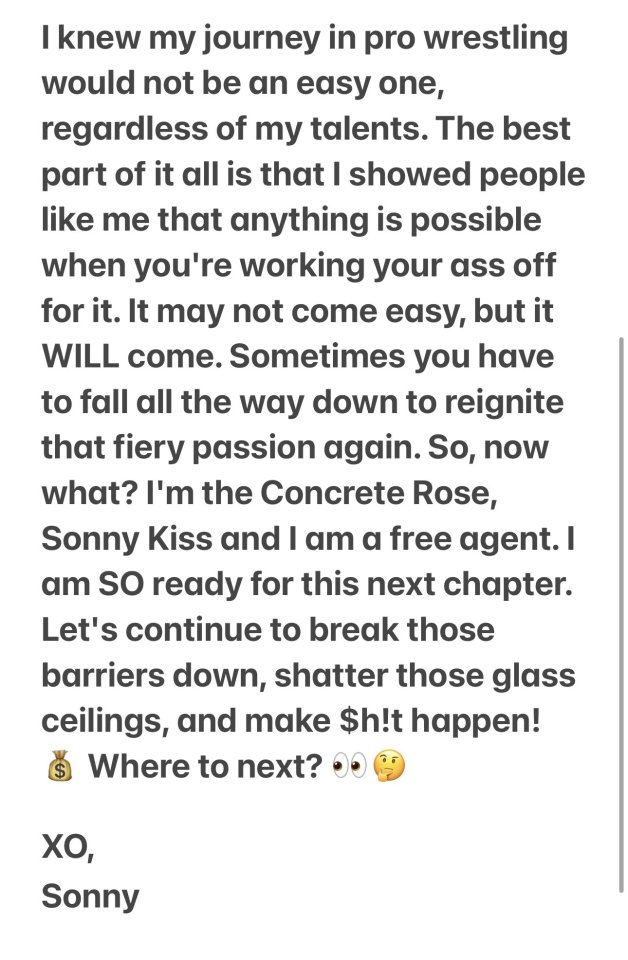
Sonny Kiss' contract with AEW has expired and is now a free agent
+ bonus: just a SMALL portion of the overflowing love in response

#wrestling#aew#sonny kiss#and to everyone thats saying no one gave her any mind... look there was like 12 of us who watched the aew youtube shows counting wwe_gareth#and we all know each other so no need to go out of your way to announce you werent there#she absolutely had a following that loved her#even the peach emoji cake watch freaks in the chat loved her as equally as the other girlies#the trustbusters oddly endeared themselves into a following too... not their entrance music though#also dont tease me trinity
191 notes
·
View notes
Text
the thing orange wanted to show on live national television was him high fiving his best friends repeatedly and honestly i think it’s a crime that he was cut off. i wanna see more of that content actually
#astra liveblogs#do not care for the trustbusters whatsoever im just here bc i think orange is a funky guy and chuck exists in a way#that i will never comprehend
72 notes
·
View notes
Text


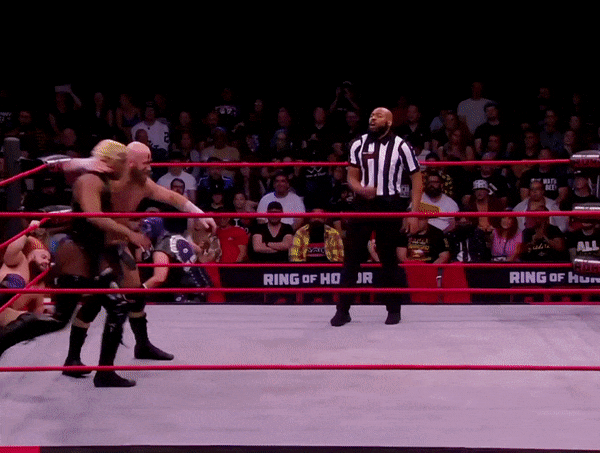
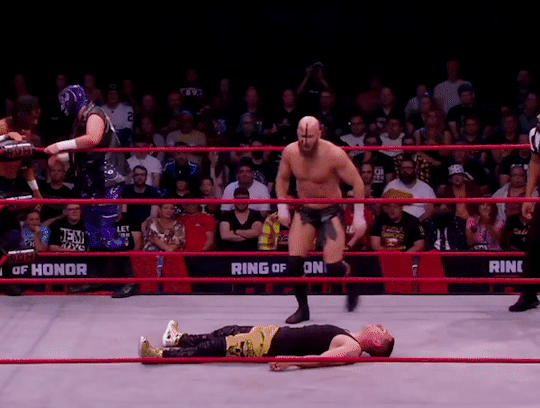

#evil uno#stu grayson#john silver#alex reynolds#josh woods#the trustbusters#ring of honor#rohedit#aew#aewedit#wrestlingedit
9 notes
·
View notes
Photo

19 notes
·
View notes
Text
The trustbusters should have bribed him with chips instead
53 notes
·
View notes
Text
Now hold on. WHY IS SONNY KISS NOT JOINING THE BADDIES? WHY IS MY HOT GYAL JOINING THIS STABLE OF MUSTY BOYS?
30 notes
·
View notes
Text
watching the era of the tentpole blockbuster oversaturation studio franchise cinema landscape crumble before my eyes . :-)
#watching repeatedly as big budget movies flop over and over with only a few successes while indie movies keep getting buzz.. :)#a trend which probably will not be ending any time soon given that big studios cant use actors for promo anymore and#if they dont get their shit together on contracts will soon not have any movies left to release w union actors in them.#meanwhile thats just like. not an issue with indie movies that meet the union demands so they get to like#capitalize on this moment where theyre trending upward by working with union actors and writers. while big studios refuse to.#anyway big studios struggling... teehee.#avpost#tbh my fave era of hollywood is definitely the like. new hollywood. post-code post-trustbusting post-television era.#after the studio era declined yknow. and i think it would be nice if we could get that energy back...#i think its possible there's a lot of parallels. to right now and the decline of the studio system#except maybe this time we will do new hollywood with a more diverse crowd so itll be less centered on white men idk.#either way thank fucking god i will not be drowning in 800 bland big event movies per year anymore.#idk sorry if i sound naive or dumb but the strike having so much public support + the failure of all these blockbusters this year#is making me a lot more optimistic that the 20s might be a really good decade for movies . as long as the striking workers get a good deal#but im not like an expert im just a person who likes movies. so its an outsiders perspective and all that
6 notes
·
View notes
Text
we could have had Ethan Page and Sonny Kiss in a tag team
we could have had the Tightest Tits & Ass in the Game
#aew#aew rampage#but no y’all send Sonny Kiss to the trustbusters???#gtfo#When I said I wanted better for Sonny Kiss this is NOT what I meant#it’s worse actually#don’t mind me#yes I watch wrestling I just don’t post about it on here#wrestling rambles
21 notes
·
View notes
Text
Kickstarting a book to end enshittification, because Amazon will not carry it

My next book is The Internet Con: How to Seize the Means of Computation: it’s a Big Tech disassembly manual that explains how to disenshittify the web and bring back the old good internet. The hardcover comes from Verso on Sept 5, but the audiobook comes from me — because Amazon refuses to sell my audio:
https://www.kickstarter.com/projects/doctorow/the-internet-con-how-to-seize-the-means-of-computation
Amazon owns Audible, the monopoly audiobook platform that controls >90% of the audio market. They require mandatory DRM for every book sold, locking those books forever to Amazon’s monopoly platform. If you break up with Amazon, you have to throw away your entire audiobook library.
That’s a hell of a lot of leverage to hand to any company, let alone a rapacious monopoly that ran a program targeting small publishers called “Project Gazelle,” where execs were ordered to attack indie publishers “the way a cheetah would pursue a sickly gazelle”:
https://www.businessinsider.com/sadistic-amazon-treated-book-sellers-the-way-a-cheetah-would-pursue-a-sickly-gazelle-2013-10
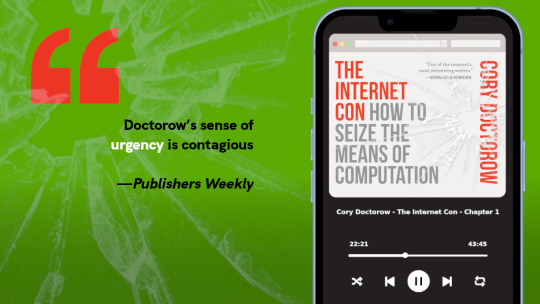
[Image ID: Journalist and novelist Doctorow (Red Team Blues) details a plan for how to break up Big Tech in this impassioned and perceptive manifesto….Doctorow’s sense of urgency is contagious -Publishers Weekly]
I won’t sell my work with DRM, because DRM is key to the enshittification of the internet. Enshittification is why the old, good internet died and became “five giant websites filled with screenshots of the other four” (h/t Tom Eastman). When a tech company can lock in its users and suppliers, it can drain value from both sides, using DRM and other lock-in gimmicks to keep their business even as they grow ever more miserable on the platform.
Here is how platforms die: first, they are good to their users; then they abuse their users to make things better for their business customers; finally, they abuse those business customers to claw back all the value for themselves. Then, they die:
https://pluralistic.net/2023/01/21/potemkin-ai/#hey-guys
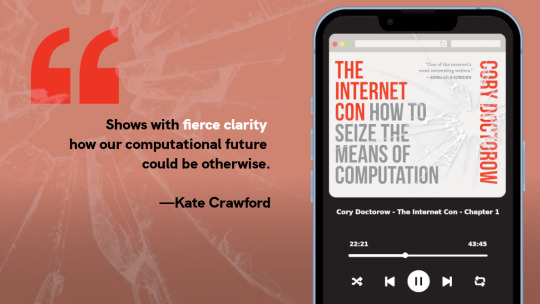
[Image ID: A brilliant barn burner of a book. Cory is one of the sharpest tech critics, and he shows with fierce clarity how our computational future could be otherwise -Kate Crawford, author of The Atlas of AI”]
The Internet Con isn’t just an analysis of where enshittification comes from: it’s a detailed, shovel-ready policy prescription for halting enshittification, throwing it into reverse and bringing back the old, good internet.
How do we do that? With interoperability: the ability to plug new technology into those crapulent, decaying platform. Interop lets you choose which parts of the service you want and block the parts you don’t (think of how an adblocker lets you take the take-it-or-leave “offer” from a website and reply with “How about nah?”):
https://www.eff.org/deeplinks/2019/07/adblocking-how-about-nah
But interop isn’t just about making platforms less terrible — it’s an explosive charge that demolishes walled gardens. With interop, you can leave a social media service, but keep talking to the people who stay. With interop, you can leave your mobile platform, but bring your apps and media with you to a rival’s service. With interop, you can break up with Amazon, and still keep your audiobooks.
So, if interop is so great, why isn’t it everywhere?
Well, it used to be. Interop is how Microsoft became the dominant operating system:
https://www.eff.org/deeplinks/2019/06/adversarial-interoperability-reviving-elegant-weapon-more-civilized-age-slay
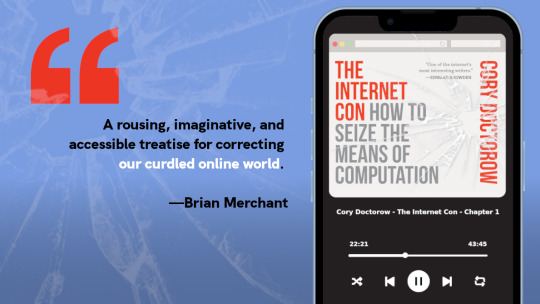
[Image ID: Nobody gets the internet-both the nuts and bolts that make it hum and the laws that shaped it into the mess it is-quite like Cory, and no one’s better qualified to deliver us a user manual for fixing it. That’s The Internet Con: a rousing, imaginative, and accessible treatise for correcting our curdled online world. If you care about the internet, get ready to dedicate yourself to making interoperability a reality. -Brian Merchant, author of Blood in the Machine]
It’s how Apple saved itself from Microsoft’s vicious campaign to destroy it:
https://www.eff.org/deeplinks/2019/06/adversarial-interoperability-reviving-elegant-weapon-more-civilized-age-slay
Every tech giant used interop to grow, and then every tech giant promptly turned around and attacked interoperators. Every pirate wants to be an admiral. When Big Tech did it, that was progress; when you do it back to Big Tech, that’s piracy. The tech giants used their monopoly power to make interop without permission illegal, creating a kind of “felony contempt of business model” (h/t Jay Freeman).
The Internet Con describes how this came to pass, but, more importantly, it tells us how to fix it. It lays out how we can combine different kinds of interop requirements (like the EU’s Digital Markets Act and Massachusetts’s Right to Repair law) with protections for reverse-engineering and other guerrilla tactics to create a system that is strong without being brittle, hard to cheat on and easy to enforce.
What’s more, this book explains how to get these policies: what existing legislative, regulatory and judicial powers can be invoked to make them a reality. Because we are living through the Great Enshittification, and crises erupt every ten seconds, and when those crises occur, the “good ideas lying around” can move from the fringes to the center in an eyeblink:
https://pluralistic.net/2023/06/12/only-a-crisis/#lets-gooooo

[Image ID: Thoughtfully written and patiently presented, The Internet Con explains how the promise of a free and open internet was lost to predatory business practices and the rush to commodify every aspect of our lives. An essential read for anyone that wants to understand how we lost control of our digital spaces and infrastructure to Silicon Valley’s tech giants, and how we can start fighting to get it back. -Tim Maughan, author of INFINITE DETAIL]
After all, we’ve known Big Tech was rotten for years, but we had no idea what to do about it. Every time a Big Tech colossus did something ghastly to millions or billions of people, we tried to fix the tech company. There’s no fixing the tech companies. They need to burn. The way to make users safe from Big Tech predators isn’t to make those predators behave better — it’s to evacuate those users:
https://pluralistic.net/2023/07/18/urban-wildlife-interface/#combustible-walled-gardens
I’ve been campaigning for human rights in the digital world for more than 20 years; I’ve been EFF’s European Director, representing the public interest at the EU, the UN, Westminster, Ottawa and DC. This is the subject I’ve devoted my life to, and I live my principles. I won’t let my books be sold with DRM, which means that Audible won’t carry my audiobooks. My agent tells me that this decision has cost me enough money to pay off my mortgage and put my kid through college. That’s a price I’m willing to pay if it means that my books aren’t enshittification bait.
But not selling on Audible has another cost, one that’s more important to me: a lot of readers prefer audiobooks and 9 out of 10 of those readers start and end their searches on Audible. When they don’t find an author there, they assume no audiobook exists, period. It got so bad I put up an audiobook on Amazon — me, reading an essay, explaining how Audible rips off writers and readers. It’s called “Why None of My Audiobooks Are For Sale on Audible”:
https://pluralistic.net/2022/07/25/can-you-hear-me-now/#acx-ripoff
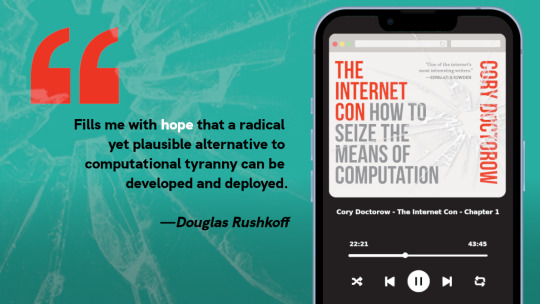
[Image ID: Doctorow has been thinking longer and smarter than anyone else I know about how we create and exchange value in a digital age. -Douglas Rushkoff, author of Present Shock]
To get my audiobooks into readers’ ears, I pre-sell them on Kickstarter. This has been wildly successful, both financially and as a means of getting other prominent authors to break up with Amazon and use crowdfunding to fill the gap. Writers like Brandon Sanderson are doing heroic work, smashing Amazon’s monopoly:
https://www.brandonsanderson.com/guest-editorial-cory-doctorow-is-a-bestselling-author-but-audible-wont-carry-his-audiobooks/
And to be frank, I love audiobooks, too. I swim every day as physio for a chronic pain condition, and I listen to 2–3 books/month on my underwater MP3 player, disappearing into an imaginary world as I scull back and forth in my public pool. I’m able to get those audiobooks on my MP3 player thanks to Libro.fm, a DRM-free store that supports indie booksellers all over the world:
https://blog.libro.fm/a-qa-with-mark-pearson-libro-fm-ceo-and-co-founder/
Producing my own audiobooks has been a dream. Working with Skyboat Media, I’ve gotten narrators like @wilwheaton, Amber Benson, @neil-gaiman and Stefan Rudnicki for my work:
https://craphound.com/shop/

[Image ID: “This book is the instruction manual Big Tech doesn’t want you to read. It deconstructs their crummy products, undemocratic business models, rigged legal regimes, and lies. Crack this book and help build something better. -Astra Taylor, author of Democracy May Not Exist, but We’ll Miss It When Its Gone”]
But for this title, I decided that I would read it myself. After all, I’ve been podcasting since 2006, reading my own work aloud every week or so, even as I traveled the world and gave thousands of speeches about the subject of this book. I was excited (and a little trepedatious) at the prospect, but how could I pass up a chance to work with director Gabrielle de Cuir, who has directed everyone from Anne Hathaway to LeVar Burton to Eric Idle?
Reader, I fucking nailed it. I went back to those daily recordings fully prepared to hate them, but they were good — even great (especially after my engineer John Taylor Williams mastered them). Listen for yourself!
https://archive.org/details/cory_doctorow_internet_con_chapter_01
I hope you’ll consider backing this Kickstarter. If you’ve ever read my free, open access, CC-licensed blog posts and novels, or listened to my podcasts, or come to one of my talks and wished there was a way to say thank you, this is it. These crowdfunders make my DRM-free publishing program viable, even as audiobooks grow more central to a writer’s income and even as a single company takes over nearly the entire audiobook market.
Backers can choose from the DRM-free audiobook, DRM-free ebook (EPUB and MOBI) and a hardcover — including a signed, personalized option, fulfilled through the great LA indie bookstore Book Soup:
https://www.kickstarter.com/projects/doctorow/the-internet-con-how-to-seize-the-means-of-computation
What’s more, these ebooks and audiobooks are unlike any you’ll get anywhere else because they are sold without any terms of service or license agreements. As has been the case since time immemorial, when you buy these books, they’re yours, and you are allowed to do anything with them that copyright law permits — give them away, lend them to friends, or simply read them with any technology you choose.
As with my previous Kickstarters, backers can get their audiobooks delivered with an app (from libro.fm) or as a folder of MP3s. That helps people who struggle with “sideloading,” a process that Apple and Google have made progressively harder, even as they force audiobook and ebook sellers to hand over a 30% app tax on every dollar they make:
https://www.kickstarter.com/projects/doctorow/red-team-blues-another-audiobook-that-amazon-wont-sell/posts/3788112
Enshittification is rotting every layer of the tech stack: mobile, payments, hosting, social, delivery, playback. Every tech company is pulling the rug out from under us, using the chokepoints they built between audiences and speakers, artists and fans, to pick all of our pockets.
The Internet Con isn’t just a lament for the internet we lost — it’s a plan to get it back. I hope you’ll get a copy and share it with the people you love, even as the tech platforms choke off your communities to pad their quarterly numbers.

Next weekend (Aug 4-6), I'll be in Austin for Armadillocon, a science fiction convention, where I'm the Guest of Honor:
https://armadillocon.org/d45/

If you'd like an essay-formatted version of this thread to read or share, here's a link to it on pluralistic.net, my surveillance-free, ad-free, tracker-free blog:
https://pluralistic.net/2023/07/31/seize-the-means-of-computation/#the-internet-con

[Image ID: My forthcoming book 'The Internet Con: How to Seize the Means of Computation' in various editions: Verso hardcover, audiobook displayed on a phone, and ebook displayed on an e-ink reader.]
#pluralistic#trustbusting#big tech#gift guide#kickstarter#the internet con#books#audiobooks#enshitiffication#disenshittification#crowdfunders#seize the means of computation#audible#amazon#verso
15K notes
·
View notes
Text
having roh and impact both open at the same time is fun bc sometimes the pee break moments overlap
5 notes
·
View notes
Text

I don't care what anyone says, Ring Of Honor is must watch TV because we finally got the return of The TrustBusters.
3 notes
·
View notes
Text
Sonny is too fucking good, I need her on ROH again fucking ASAP
2 notes
·
View notes
Text


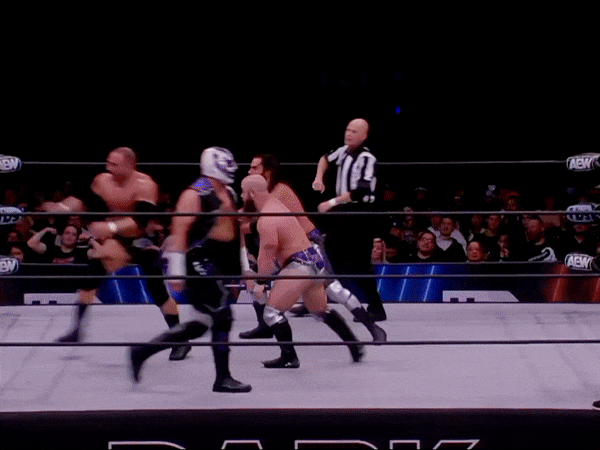






16 notes
·
View notes
Photo

32 notes
·
View notes